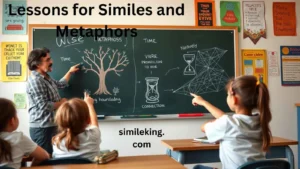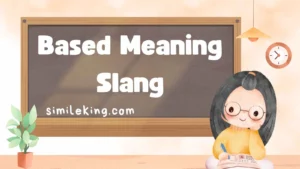Describing bad weather isn’t just about saying “it’s raining” or “it’s cold.” Language offers a colorful array of similes that can bring these scenarios to life. Using similes—comparisons using “like” or “as”—we can paint vivid pictures of the atmosphere around us. Whether you’re writing a story, sending a message to a friend, or composing an email to a client, the way you describe bad weather matters. The right tone—casual, polite, or professional—can transform your communication and make it feel thoughtful, engaging, and appropriate.
This article covers:
- 20+ similes for bad weather
- How tone affects word choice
- Casual, polite, and professional variations
- 10 texting examples
- Conclusion and meta description for web use
Let’s start by exploring the most effective similes for various types of bad weather.
Section 1: What Makes a Good Simile for Bad Weather?
A good simile for bad weather should be:
- Evocative: It paints a mental picture.
- Tone-appropriate: It suits the mood (casual, professional, etc.).
- Contextual: It matches the intensity or type of bad weather (rain, storm, snow, etc.).
- Creative but Clear: Easy to understand and imaginative at the same time.
Section 2: Similes for Rainy Weather
Casual Tone
- Like the sky’s got a broken faucet
“It’s been raining nonstop, like the sky’s got a broken faucet.” - Like someone’s crying up there
“It’s pouring outside like someone’s crying up there.” - Like a garden hose turned on full blast
“That rain came down like a garden hose turned on full blast.”
Polite Tone
- As steady as a piano recital
“The rainfall was as steady as a piano recital, calm yet constant.” - Like soft drums tapping on the roof
“The raindrops sounded like soft drums tapping on the roof.”
Professional Tone
- Like nature’s orchestra in a minor key
“The consistent drizzle was like nature’s orchestra in a minor key—somber yet rhythmic.” - Like a curtain of mist drawn across the sky
“The rain fell like a curtain of mist drawn across the sky, reducing visibility significantly.”
Section 3: Similes for Stormy Weather
Casual Tone
- Like a toddler having a tantrum
“That thunderstorm was wild—like a toddler having a tantrum.” - Like a rock concert in the clouds
“The lightning and thunder clashed like a rock concert in the clouds.”
Polite Tone
- As dramatic as an opera finale
“The storm rolled in as dramatic as an opera finale.” - Like the heavens are clearing their throat
“That thunder was like the heavens clearing their throat—deep and resonant.”
Professional Tone
- Like a freight train passing through the clouds
“The storm arrived with thunder like a freight train passing through the clouds.” - As volatile as a shaken carbonated drink
“The pressure system is as volatile as a shaken carbonated drink—ready to burst.”
Section 4: Similes for Cold or Snowy Weather
Casual Tone
- Like a freezer exploded outside
“It’s so cold—feels like a freezer exploded outside!” - Like a snow globe getting shaken up
“It’s snowing like a snow globe getting shaken up.”
Polite Tone
- As gentle as powdered sugar on a cake
“The snowfall was as gentle as powdered sugar on a cake.” - Like feathers falling from the sky
“Snowflakes drifted down like feathers falling from the sky.”
Professional Tone
- As silent and consistent as a printing press
“The snow was falling as silent and consistent as a printing press in motion.” - Like a blanket drawn across the landscape
“The snowfall was like a white blanket drawn across the landscape, cooling everything beneath.”
Section 5: Similes for Windy Weather
Casual Tone
- Like nature’s hairdryer on full blast
“The wind’s going crazy—like nature’s hairdryer on full blast.” - Like invisible hands tossing everything around
“The wind’s blowing like invisible hands tossing everything around.”
Polite Tone
- As restless as a child before bedtime
“The wind seemed as restless as a child before bedtime.” - Like a ballet dancer spinning through the trees
“The breeze danced like a ballet dancer spinning through the trees.”
Professional Tone
- Like a turbine running at full capacity
“The gusts moved through the valley like a turbine running at full capacity.” - As persistent as a whisper in an empty hall
“The wind was as persistent as a whisper in an empty hall—always present, always moving.”
Section 6: Tone Nuances and Contextual Application
Choosing the right simile depends on:
- Audience: Are you speaking to a friend or a colleague?
- Purpose: Is it for creative writing, a report, or a text?
- Tone: Are you aiming for humor, formality, or empathy?
Example:
- Casual: “It’s raining like the clouds are having a meltdown.”
- Polite: “It’s raining like a melody played on nature’s piano.”
- Professional: “The rain was steady and consistent, like a metronome set on low.”
This tone control enhances the professionalism or relatability of your message.
Section 7: 10 Texting-Friendly Examples for Bad Weather
These examples are short, relatable, and easily usable in modern digital communication:
- “It’s raining like my playlist is on repeat—slow and moody.”
- “The sky’s acting like it got dumped. Total mess out there.”
- “Feels like a giant fan’s been left on high all day.”
- “It’s snowing like the North Pole moved here.”
- “Thunder’s so loud, it’s like the sky’s got a subwoofer.”
- “That wind’s got more attitude than my Monday mornings.”
- “Rain’s tapping like it wants to come in for coffee.”
- “Storm’s got vibes—definitely dramatic.”
- “Snow looks like powdered sugar spilled all over the yard.”
- “That lightning flash was like a paparazzi moment for the clouds.”
These similes are conversational, expressive, and optimized for engagement, making them perfect for texting or social media captions.
Conclusion
Bad weather isn’t just a change in the forecast—it’s an opportunity to use expressive, tone-appropriate language. Similes give us the chance to describe storms, rain, snow, and wind in creative and relatable ways. By choosing the right simile for the right context, you not only improve your communication but also demonstrate creativity and emotional intelligence.
Whether you’re writing casually, communicating professionally, or expressing something politely, there’s a simile for every kind of bad weather.





